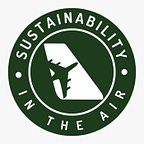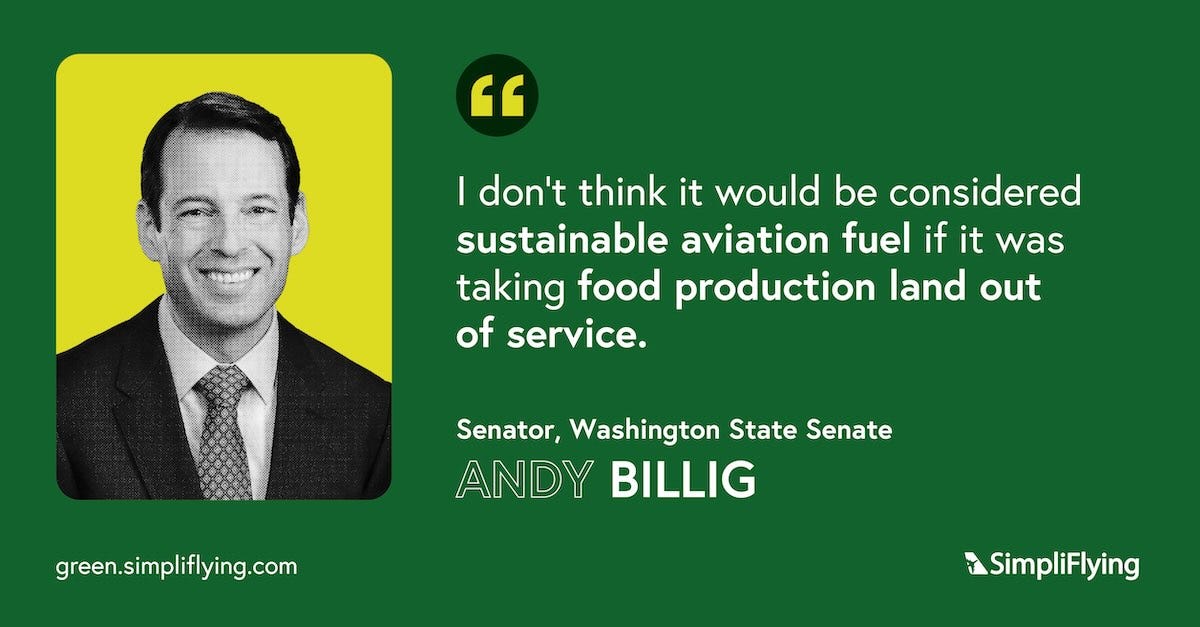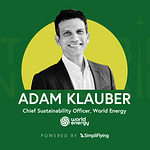In this episode of our ‘Sustainability in the Air’ podcast, Senator Andy Billig, Senate Majority Leader at Washington State Senate, speaks with SimpliFlying CEO Shashank Nigam on how he has spearheaded efforts to integrate environmental stewardship with legislative action in Washington State.
Andy Billig’s diverse roles, from a Spokane community leader to a champion of children's education and working families, have been complemented by his ambitious environmental agenda. Diving into sustainable aviation fuel (SAF) legislation in 2012 marked a significant pivot in his career, aligning his legislative efforts with environmental stewardship. Billig’s legislative journey underscores his commitment to reducing carbon emissions and safeguarding Washington’s natural landscapes, notably the Spokane River.
Here are the key highlights of the conversation:
The introduction of SAF legislation in Washington State (2:13)
Senate Bill 5447 and its impact on the aviation industry (5:34)
The role of Washington State Sustainable Aviation Fuels Workgroup (9:16)
Washington’s stance on various SAF pathways (19:59)
SAF pathways and bridging the price premium for SAF (21:26)
Perspectives from the environmental community (33:33)
Rapid Fire! (37:20)
Keep reading for a quick overview of the episode.
Why Senate Bill 5447 matters
Senate Bill 5447 stands as a testament to Washington State’s commitment to fostering a sustainable aviation ecosystem.
By offering tax incentives for SAF production and purchase, the bill targets the enhancement of local SAF production, filling a critical gap in the state’s green aviation sector, while also creating family-wage jobs and stimulating economic growth in the State.
It is designed to reward the production of cleaner fuels, aligning financial incentives with environmental benefits, a move well-received by both fuel producers and airlines for its innovative approach to reducing aviation’s carbon footprint.
Moreover, SAF usage is expected to significantly reduce greenhouse gas emissions, and improve air quality in Washington.
“The Washington bill doesn’t have a cap; it also increases based on the carbon intensity. So, the better the fuel is for the lifecycle of that fuel, when you look at the feedstock, the more credit you’re gonna get.”
5 key takeaways from Billig’s sustainability journey
1. The importance of neutral legislation and market dynamics
Emphasising a technology-neutral legislative approach, Billig advocates for flexibility in adapting future technologies.
By avoiding favouring specific technologies or feedstocks, this legislative strategy aims to accommodate and encourage new developments in the field, such as carbon capture technologies, which are increasingly becoming economically viable.
This would also ensure that the law remains inclusive, fostering a competitive market that would balance resource allocation between SAF and other sectors, such as biodiesel, says Billig.
2. SAF strategies — US vs. EU
The varying approaches to SAF policies in the EU and the US significantly shape the global SAF landscape.
The EU’s mandate-driven strategy, which enforces specific requirements for SAF usage, contrasts with the US’s preference for incentive-based policies that encourage voluntary adoption.
This divergence not only influences the pace and scale of SAF adoption in each region but also affects global SAF market dynamics, with implications for production, distribution, and technological development.
3. Washington State Sustainable Aviation Fuels Workgroup
The Washington State Sustainable Aviation Fuels Workgroup has played a crucial role in the development and advancement of SAF initiatives in the region.
This workgroup was established 12 years ago, following the Sustainable Aviation Fuel Northwest (SAFN) assessment in 2011, which was the nation’s first regional assessment of its kind. The assessment, involving key stakeholders like Boeing, Alaska Airlines, airports, Washington State University, and environmental groups, concluded that the Northwest region in the US was ideally positioned to advance SAF technology and production.
Since then, the workgroup has been instrumental in gathering feedback from various stakeholders, including fuel producers and airlines, and was a key contributor to Senate Bill 5447. Inputs from the group were crucial in establishing a flexible credit system in the state of Washington for SAF, allowing credits to be utilised by producers, SAF blenders, or airlines, enhancing the bill’s appeal and effectiveness.
4. Perspectives from the environmental community
The environmental community in Washington has largely supported the SAF bill, actively participating in the stakeholder group and the SAF workgroup.
However, a minority within the environmentalists argue for reducing or ceasing flights as a means to decarbonise the aviation industry, viewing the bill as an enabler for continued flying without sufficiently addressing carbon reduction needs.
Billig, however, believes that complete avoidance of flying is not a pragmatic strategy for combating climate change. Furthermore, concerns have also been raised about the siting of green energy facilities necessary for the transition to a green economy.
Billig also points out that the environmental groups’ concerns about the lifecycle evaluation of SAF feedstocks is a legitimate one, emphasising the importance of ensuring the sustainability aspect in SAF. This includes robust evaluation processes and tracking systems to prevent double-counting of credits, ensuring the industry's accountability in delivering truly sustainable aviation fuel.
“I think concerns that the lifecycle of the feedstocks may not be robustly evaluated is a real legitimate concern [of the environmental community], that the industry needs to account for and say [that] the “S” in SAF is sustainable… and we’re gonna make sure that we deliver on that.”
5. Industry momentum post-legislation
Since the Senate Bill 5447 has been passed, there has been tangible industry momentum, with notable companies like SkyNRG and BP making moves to establish SAF production facilities in Washington.
SkyNRG’s CEO has lauded the legislation, describing Washington state as “the most attractive, most supportive state for SAF.”
Carbon transformation company Twelve has also announced plans to scale the production of its E-Jet® fuel, with a commercial-scale production facility in Washington.
This highlights the bill’s success in attracting industry interest and investment, setting the stage for significant developments in the state’s SAF production capabilities.
‘Sustainability in the Air’ is the world’s leading podcast dedicated to sustainable aviation. Through in-depth conversations with top aviation leaders, we break through the clutter and provide a clear roadmap for a net-zero future.













